By Pepper Parr
This is the first of a series of interviews on the three candidates running in the provincial election taking place October 6th. Each candidate was asked the same questions.
Along with their answers are the impressions and insights gained from the time spent with each candidate. Some we had met before the interview – others were new to us.
There are those in the community who describe Our Burlington as a news source with a “Liberal” slant. Not true. As the publisher of Our Burlington my responsibility is to the community. On balance I personally tend to vote Liberal but have voted for other parties. John Robarts was a great Premier and Bill Davis did a really good job as well; I voted for both of them. One’s political party is a philosophical choice but my view is that you look for the best person to represent your community. We start this series with Karmel Sakran, the Liberal candidate, and will follow with Peggy Russell, the NDP candidate. And then Jane McKenna, the Progressive Conservative candidate. The intention is to follow up with the candidates as the election progresses.
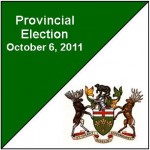 BURLINGTON, ON August 19th, 2010 – The three top items in the provincial election for Liberal candidate Karmel Sakran are the hospital, the proposed escarpment highway and the economy. He has developed views on what the hospitals needs are, the result of his e served on the Board and was part of the hiring committee that brought in the current President and CEO, Erik Vanderwall.
BURLINGTON, ON August 19th, 2010 – The three top items in the provincial election for Liberal candidate Karmel Sakran are the hospital, the proposed escarpment highway and the economy. He has developed views on what the hospitals needs are, the result of his e served on the Board and was part of the hiring committee that brought in the current President and CEO, Erik Vanderwall.
“Eric told me that all he needed was the funding to get the Joseph Brant Hospital to what it should be for a city like Burlington”, said Sakran. He added “the hospital has not had a significant upgrade since it was built and points out that the hospital has had the same footprint for more than forty years and that the community has grown significantly over that period of time.
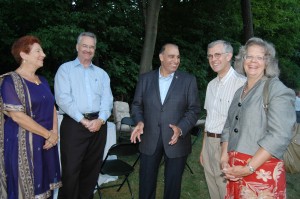
Karmel Sakran chats with guests and supporters at a fund raising event held for him at the home of Dr. James Henry, Burlington’s Senior of the year.
Burlington has been waiting for some time to learn when the province is going to commit to upgrading the hospital. The city has more than $2.5 million sitting in a reserve fund waiting to give it to the hospital and a commitment to provide an additional $2 million a year for the next ten years. Should Sakran actually get to Queen’s Park one can expect him to follow through on his experience on the hospital board. But given that there is an election going on which becomes – make good on the promises time – we can expect an announcement on the hospital before the votes are counted.
Karmel says he has had two conversations with the Premier and believes there will be a very positive announcement very soon. “The leader knows where I stand”, said Sakran. As a candidate there isn’t much more the guy can do.
Besides serving on the hospital Board, and had he not resigned, as he had to, when he declared his candidacy, Sakran would have eventually become the Chair of the hospital Board, a position with a significant amount of social prestige. Besides his involvement with the hospital (and involvement is putting it lightly) Sakran was one of the founding members of the Carpenter Hospice. “I was at a Rotary meeting” he explains ” when Tony Goodrow spoke of an idea that former Burlington Mayor Rob MacIsaac had come up with, which was the creation of a hospice for the community. I put my hand up and said I’d like to be part of that. I did the legal work for what is a non profit corporation. I was heavily involved in that project which opened in 2002.”
Sakran then came up with an idea for an annual fund raising event for the hospice: Annual Wills and Powers of Attorney that has raised $50,000. since its inception. Last year Sakran donated the money raised the United Way campaign which he chaired and pushed the campaign past its target of $2. million. Sakran has certainly earned a lot of brownie points for his community work – is that enough to elevate one from community to the legislature?
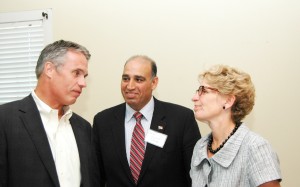
Mayor Rick Goldring in conservation with Minister of Transportation Kathleen Wynne with Liberal candidate Karmel Sakran looking on. The Mayor isn’t all that sure the Minister’s promise not to run a highway through the Escarpment is something he can rely upon. Sakran is hoping her promise will deliver some of those old Tory votes to him.
The “promise not to build a highway through the Escarpment and a hospital announcement will certainly do wonders for a Liberal candidate – but 43 years of Conservative history isn’t easy to overcome unless you really motivate the voters. Can Sakran do that?
Throughout the 50 minute interview Sakran wanted to put forward what the government had done for the province and what the opposition was not being honest about. Our purpose with these candidate interviews was to get a look at the candidate and find out who they were and what they would do for Burlington.
We asked each candidate: which came first: their political party or their community. Sakran doesn’t say exactly which comes first. One gets the impression that for Karmel Sakran it is the individual more than the wider community that counts. Sakran says, quite forcefully, that one has to respect the listener. “You have to believe their intentions are good and see the best in them when you advocate on their behalf. I try to understand the motives behind what people are saying and believe in the goodness of the individual.”
He adds that much of the work for an MPP gets done at the office. I will meet with my fellow MPP’s and gain their support for something I want for Burlington. He fails to add that in asking for support for a project he will be expected to give support to the MPP for their projects.
Sakran points out that his experience as a lawyer is advocating and he firmly believes that while he has no political experience he can be a solid advocate for Burlington. “I will have to make my case but that’s what I do for a living” and indeed Sakran does know how to make a case. “It is really about how well you advocate, how well you do your homework, how connected you are to caucus – and that you are always “upfront’ with people. “Choosing who should represent the community boils down to: leadership, judgment and credibility”, according to Sakran.
Sakran likes the provinces Places to Grow policy. “We have to cut back on the urban sprawl and use the land we have responsibly. Sakran is glad there is a “consistent province wide approach and sees the policy as “cutting edge legislation
On the matter of a highway through any part of the Escarpment – Sakran is dead certain – No! However, when asked for his views on the current OMB hearing on the Nelson Quarry expansion, Sakran equivocates and says it would be inappropriate for him to comment on a matter before the OMB. “It would be irresponsible to not let that process go to completion.” The Nelson Quarry application for an expansion is all part of what is going to happen to the rural part of Burlington. The OMB hearing is not a court case; it is a hearing at which different parties make their views known. Sakran isn’t a party to the hearings, there is no reason he can’t make a comment as a citizen. But he chose not to. To me it came across as hiding behind an excuse. He is an informed citizen and surely understands the link between allowing further quarry mining on the Escarpment and possibility of building of a highway through that part of the city. So much for putting the community first.
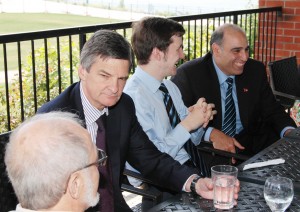
When you are running for the governing party you’re able to bring in Members of the government. Here Ontario Attorney General Chris Bennett chat with a group of lawyers. Karmel Sakran, Burlington Liberal candidate is on the extreme right.
Sakran is the kind of guy who goes after what he wants. After graduating from law school he decided he wanted to work in the criminal prosecutors office in Toronto and sent in an application. He got what he was pretty sure was a form letter response saying basically – no thanks. So he called up the person who had signed the letter and explained to them that they didn’t understand – he was the kind of person they should be interviewing a and he got an interview. On the appointed day he was sitting in a coffee shop opposite the government office at 720 Bay at 7 am “sweating like crazy” for his 8 am appointment. “I wasn’t going to be late for that interview. He got hired for the short term position.
Karmel Sakran is the son of an immigrant grocer who came to Canada from the Middle East so that his children could have a better life. Norm, his Dad was a highly trained professional in the Middle East and gave up his life in that part of the world so that his boys could grow and be educated in a safer society.
Karmel’s Father was the touchstone of his life. His Father supported his community anyway he could. There wasn’t a lot of money around, small convenience stores don’t generates piles of money but Norm was always there with a helping hand. Karmel is fond of saying that for years few knew him as Karmel. “I was mostly known as Norm’s kid.”
Sakran has an odd view on giving speeches. He feels better sitting with people one on one, but there are times when a public person has to speak to the larger community. Sakran prefers to speak from the heart – which suggests that there isn’t a full understanding of what it is to give a speech. Winston Churchill certainly spoke from the hearts when he held the spirit of the British people aloft during the darkest days of WW II. And John Diefenbaker was speaking from the heart when he shook those jowls of his and let Canadians know what he thought. On the speech level, Sakran may have something to learn; perhaps he was trying to differentiate himself from the public view of politicians.
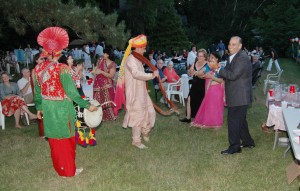
It was both a fund raising event and a cultural festival. Sakran, the Liberal candidate in the forthcoming election steps his way through a dance routine.
There was an interesting piece in the New York Times that talked of what politicians need to do when they make speeches – it is appropriate to pass some of that article to you.
“The stories our leaders tell us matter, probably almost as much as the stories our parents tell us as children, because they orient us to what is, what could be, and what should be; to the worldviews they hold and to the values they hold sacred. Our brains evolved to “expect” stories with a particular structure, with protagonists and villains, a hill to be climbed or a battle to be fought. Our species existed for more than 100,000 years before the earliest signs of literacy, and another 5,000 years would pass before the majority of humans would know how to read and write.
Stories were the primary way our ancestors transmitted knowledge and values. Today we seek movies, novels and “news stories” that put the events of the day in a form that our brains evolved to find compelling and memorable. Children crave bedtime stories; the holy books of the three great monotheistic religions are written in parables; and as research in cognitive science has shown, lawyers whose closing arguments tell a story win jury trials against their legal adversaries who just lay out “the facts of the case.”
When Barack Obama rose to the lectern on Inauguration Day, the nation was in tatters. Americans were scared and angry. The economy was spinning in reverse. Three-quarters of a million people lost their jobs that month. Many had lost their homes, and with them the only nest eggs they had. Even the usually impervious upper middle class had seen a decade of stagnant or declining investment, with the stock market dropping in value with no end in sight. Hope was as scarce as credit.
In that context, Americans needed their president to tell them a story that made sense of what they had just been through, what caused it, and how it was going to end. They needed to hear that he understood what they were feeling, that he would track down those responsible for their pain and suffering, and that he would restore order and safety.
These stories are called speeches – that is what leaders do when their community needs to hear from them. The full articles van be found at:
https://www.nytimes.com/2011/08/07/opinion/sunday/what-happened-to-obamas-passion.html?
The economy is important to Karmel Sakran. He understands the need for a strong economy but then all politicians say that – what Sakran wants to focus on is a stronger “local economy”. He doesn’t get specific but makes the point that more and better government involvement is possible when the member for the city is part of the government.
Sakran makes the statement that 90% of the people who live in Burlington are one pay cheque away from poverty – which I found an exaggeration. There are poor people in Burlington but this city is not a poor city and while there are never enough social services we do not have people standing outside soup kitchens.
Sakran trots out the usual line of public service being the highest form of trust one can have with their community that is equaled only by the trust people have in the police and the trust that one has with their spouse. Given the high divorce rate in this province one wants to look askance at spousal trust.
Serving the community is a job that not all that many people can do well. It calls for understanding the community and finding a way to balance all the competing interests and still be able to get the job done. Being chosen by ones peers is humbling for the community has publicly selected you to lead.
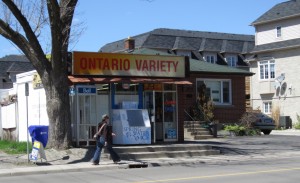
The Sakran family ran and still runs the Ontario Variety, a small store that has served the community for many years. Karmel worked behind the counter and swept the floors and was always known as “Norm’s kid”. His Father was revered and respected by his peers.
The son of a grocer, Sakran has a deep appreciation for the community he grew up in and now lives and works in. “Burlington is the hub of a collection of communities; we are the apex and play a significant role in the make up of the GTA” he explains. “For the longest time we were happy to be a bedroom community, an unappreciated jewel in the Golden Horseshoe – but those days are past. Queen’s Park hasn’t paid much attention to Burlington and I think that day should be past as well. We can’t stay silent anymore.” Sakran wants a change and hopes that people in Burlington vote for more than a tag line.
[retweet]

















